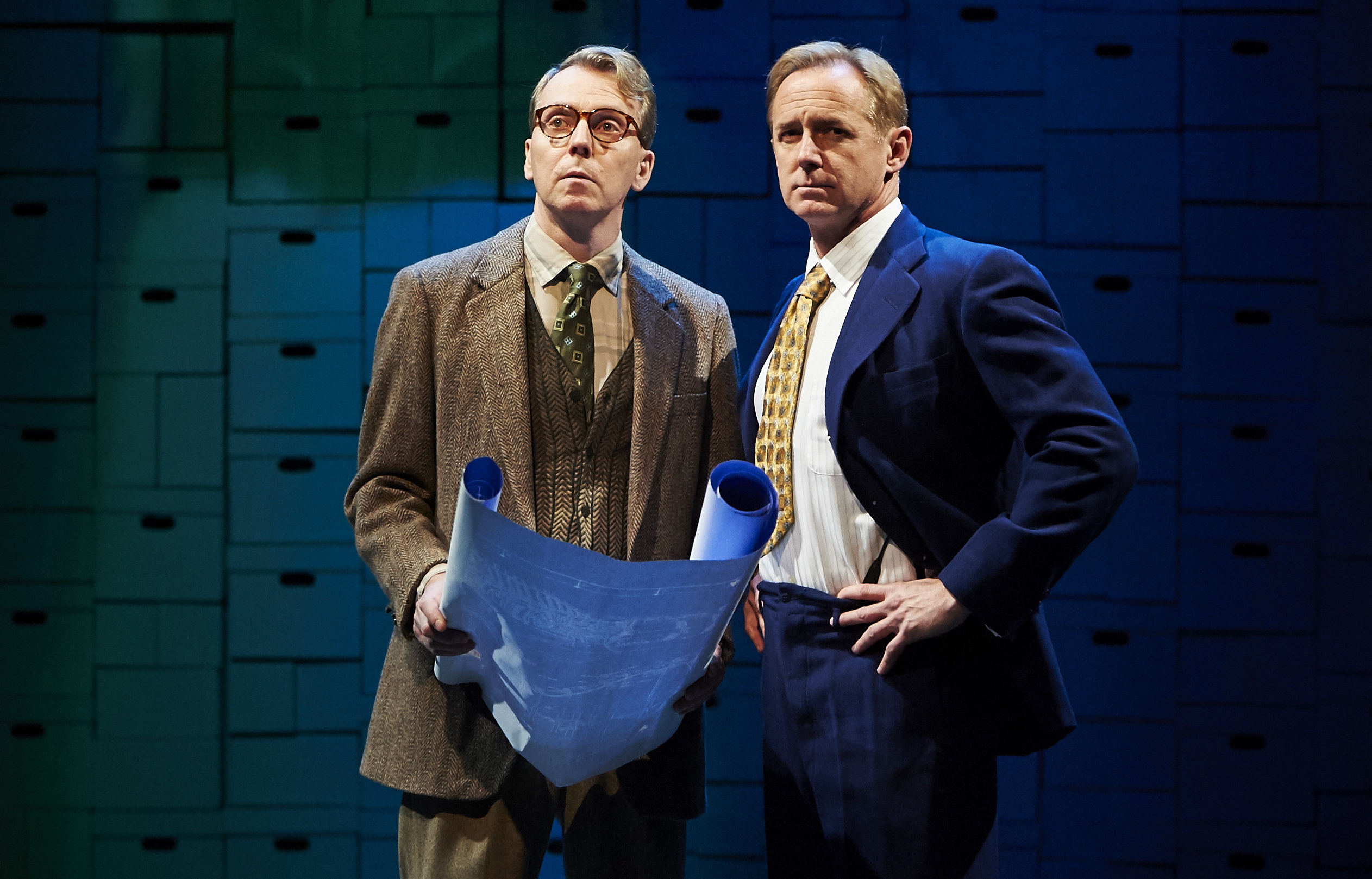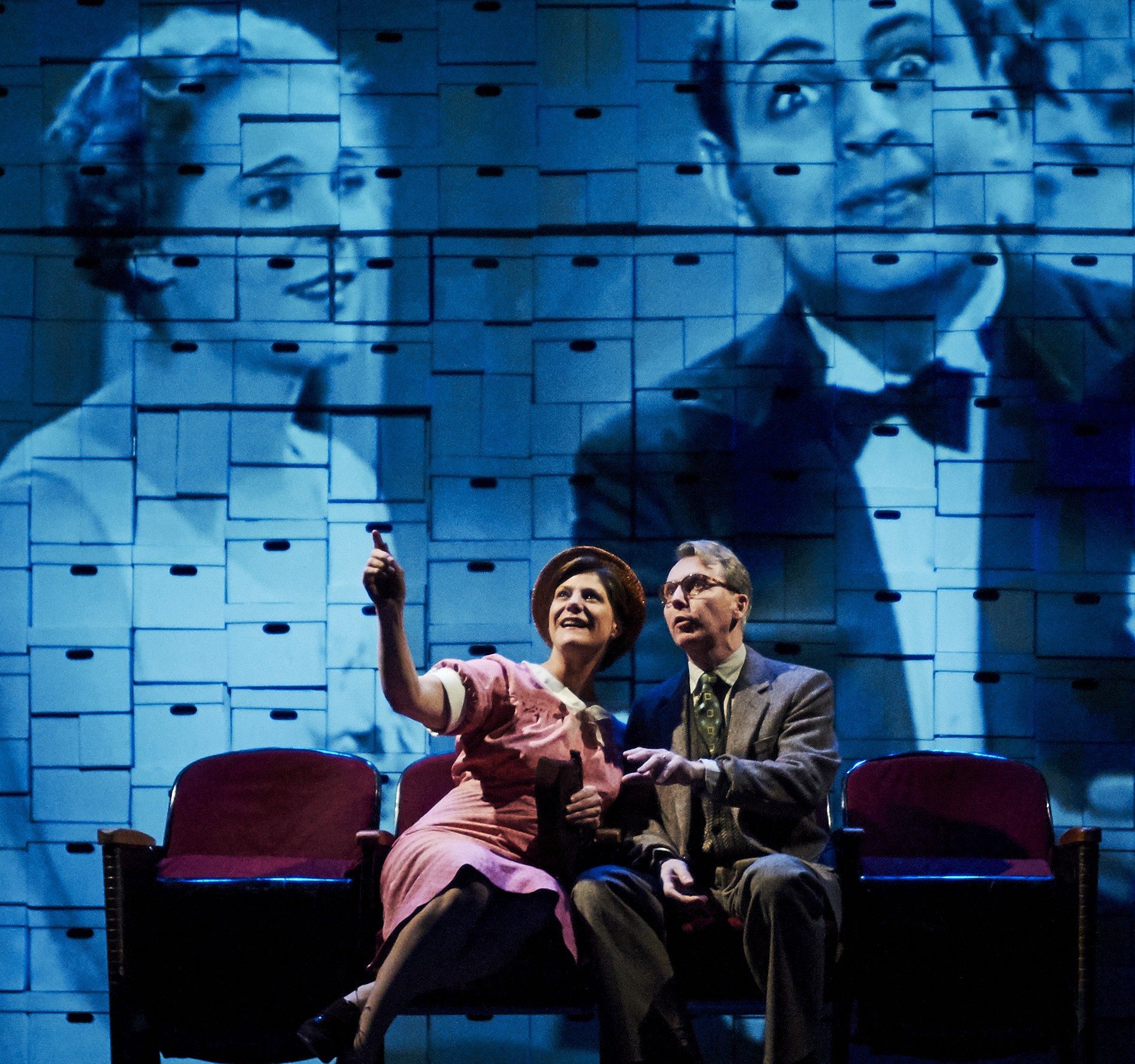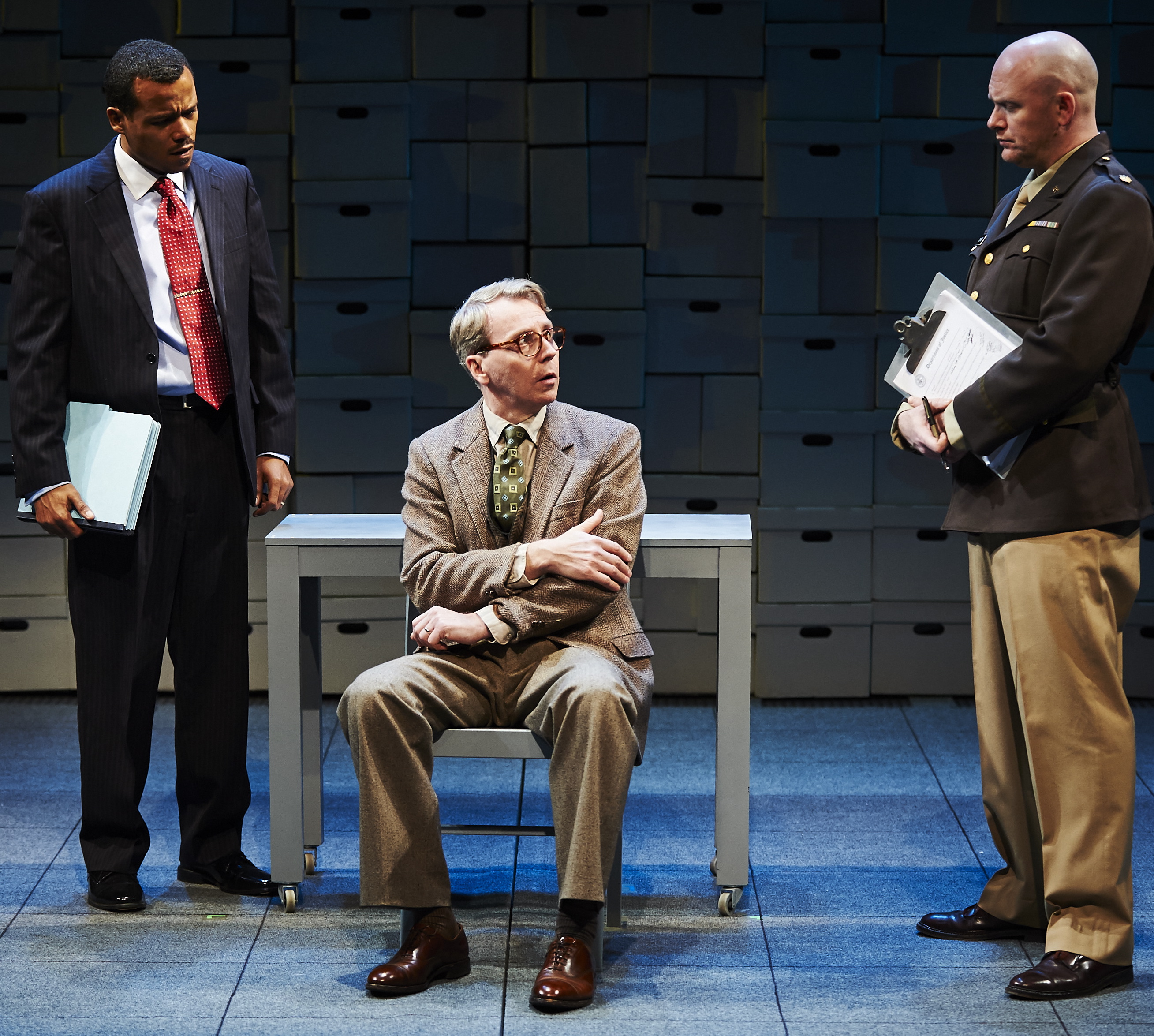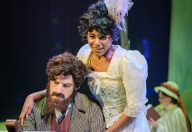Morality Play: In ‘Some Brighter Distance,’ Who Is Not Guilty?

Arthur Rudolph (Jonathan Tindle, left) and Wernher von Braun (David Whalen) see the light. The question is, do they see the tunnel?
An important part of any theater experience is the aftereffects. Some plays are like bottle rockets: They dazzle and delight and send you tripping lightly into the night, but soon they fizzle and it’s, “Okay, where do we eat?”
Other plays are like multi-stage rockets. Once the show is over, the next stage kicks in. You wind up thinking and talking about the play to the point where hot chicken wings turn cold on the platter, unconsumed, because what you have seen gives you more provocative matter to chew on.
Some Brighter Distance is that kind of play. Sitting here to write a review, all I want to talk about are the issues it stirs and the conversations I’ve had afterward. Remind me to say a few things about the play itself.
What the Devil?
City Theatre is performing the world premiere of Some Brighter Distance. It’s by Keith Reddin, an American playwright whose work often deals with moral ambiguities and ironies. He took the play’s title from a line in Goethe’s Faust:
“Yes, resolute to reach some brighter distance, on Earth’s fair sun I turn my back!”
You may recall Faust as the guy whose striving went too far and who sold his soul to the Devil. Have the characters in Reddin’s new play done the same? If so, perhaps we all should be checking our wallets to see whether we’ve still got our souls, because Some Brighter Distance is based on real events. Although a lot of the personal interaction is obviously made up for dramatic (or comedic) purposes, the major deeds depicted definitely happened. And not only have they shaped today’s real world, they also reflect how we continue to live in it.
From Fact to Drama
Some facts: At the end of World War II, a U.S. intelligence program called Operation Paperclip tracked down large numbers of German scientists and engineers who had, in the Nazi regime, built the V-2 rockets launched against London and other Allied cities. These men were eventually brought to the United States where they led the design of new American rockets—first for the country’s nuclear arsenal, then for the Apollo space flights.
The most famous Paperclip immigrant was Dr. Wernher von Braun (played in Some Brighter Distance by David Whalen). In addition to leading the U.S. space program, the dapper and eloquent von Braun became a media celebrity as the program’s public figurehead. There were some qualms over his prior role in the German war effort. When Hollywood made a biopic about von Braun, called I Aim at the Stars, the joke was that it should be subtitled “But Sometimes I Hit London.” By and large, however, the man’s Nazi past was conveniently ignored.
And so was Arthur Rudolph’s—until it unexpectedly came to light. Rudolph (Jonathan Tindle) is the central character in Some Brighter Distance. He had worked closely with von Braun in Germany and served as a high-ranking engineer and project manager on the Apollo missions. Then, years after he retired to private life, the Justice Department called him in. A special unit investigating Nazi-era war crimes had linked Rudolph to abuses of forced labor at the V-2 rocket factory, where concentration-camp inmates and POWs were pressed into service most brutally, and thousands died.

Ah, sweet youth. In a flashback scene, Marthe (Elizabeth Rich) gets a rise out of Rudolph’s fave flick, the sci-fi thriller “Woman in the Moon.”
This development becomes the pivot of Some Brighter Distance. Scenes of the elderly Rudolph sparring verbally with a Justice Department lawyer (LeRoy McClain) and Army major (Matthew Stocke) are mixed with numerous flashbacks. But the play is different from other notable plays and films about Nazi hunters and Nazis.
Judgment at Nuremberg and The Man in the Glass Booth, for instance, are courtroom dramas. The action revolves around trying the case. But Rudolph wasn’t brought to trial. Instead, the government made an offer he couldn’t refuse: Renounce your American citizenship and leave quietly—before this ugly mess makes headlines. Or as McClain’s character tells Rudolph, “Honestly, everyone would just like you to disappear.”
So what we get in Some Brighter Distance is a play that personalizes the story—often leavening it with humor, in tones from dark to dizzy—while bringing out many, many moral conundrums, from personal to public policy.
Geeking into the Morass
A few observations about the play:
First, the flashback scenes are good. They start in 1929 with a young Rudolph wooing Marthe (Elizabeth Rich), the woman he’ll marry. These scenes have some pretty nice rom-com, and they also establish a theme that runs through the play: Arthur Rudolph is an archetypal science geek. He’s obsessed with rocketry and with the grand goal of flying to the Moon. (In one cool bit, Arthur and Marthe are watching actual clips from Fritz Lang’s silent sci-fi movie Woman in the Moon.)
Second, the plot thickens—as does the moral morass—gradually but inexorably. Oh, to build rockets in Hitler’s Germany, you have to build rocket weapons. And be a Nazi … and then when the Nazis lose, you have to switch flags … which the Americans will gladly help you and your friends do, even maybe whitewashing your resumes a little! There’s more, but you get the picture. Step by step, everybody keeps bending their standards or bending the rules until everything is bent.
Third, the Rudolph, Marthe, and von Braun trio makes an interesting triangle. Not literally—von Braun doesn’t seduce Marthe, though he has the notion (the real von Braun was a womanizer)—but in terms of contrasting personalities. Von Braun’s preening and posturing, played against Rudolph’s nerdish persistence and Martha’s resolve to stand by her nerd, give the actors some good stuff to work with and the audience scenes to enjoy.

Ah, the bitter end: Rudolph cornered by attorney Davis (LeRoy McClain, left) and Major Turner (Matthew Stocke).
Lastly, I wasn’t totally sold on the Justice Department scenes that featured the other combo: Rudolph with the attorney and/or the Army major. Maybe it’s how the scenes were played on the night I went, or maybe it’s the writing (a lot of exposition has to be worked in here). Anyway, at times the dramatic illusion wasn’t there, and I felt as if I were watching actors do scenes in a play.
But as for the whole thing: Oh yeah, it’s interesting. About 70 percent of the audience gave the play a standing O. Now for what happened after.
Drawing the Bottom Line
You should know that like Rudolph, I have an engineering degree. I worked in the profession for only a short while—on routine machinery, not space rockets—but some of my schoolmates went on to become high-level researchers in such fields as computing and robotics. I met one of these fellows at a reception after Some Brighter Distance.
He found the play’s dilemmas very realistic, noting that he and many of his colleagues have, at times, wrestled with the moral implications of their work. He said some university researchers will not accept funding from the Department of Defense—which is quite a line to draw in the sand, as DoD funds a huge portion of the nation’s research—while others try to draw different lines, such as not working on technology that’s clearly meant to be weaponized.
My friend and I agreed that the latter is a tough call to make, since almost anything can be put to war—or, conversely, to civilian purposes. Without DoD funds, you might not be reading these words right now. Defense research led to the Internet and the chips in your computer.
But my friend was adamant on one point: Just saying that you are doing your work “for science” isn’t good enough. Simply invoking some higher end—whether it’s the advancement of human knowledge, the true religion, or whatever—does not buy a pass to use any means necessary toward a goal. The steps we take may affect others; they may affect the state of our minds and spirit.
In short, there are moral decisions to be made. And they are not necessarily rocket science. Often, they’re harder.
Closing Credits and Ticket Info
Playwright Keith Reddin’s name is pronounced Red-DEAN. His Some Brighter Distance is directed for City Theatre by Tracy Brigden. Through Feb. 14 at 1300 Bingham St., South Side. For showtimes and tickets, visit the City website or call 412-431-CITY (2489).
Photos: by Kristi Jan Hoover
Mike Vargo, a Pittsburgh-based writer and editor, covers theater for Entertainment Central.
Share on Social Media
Follow Entertainment Central
Latest Stories
Sign up for the EC Newsletter







